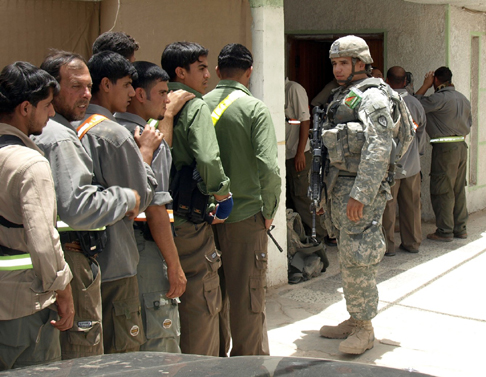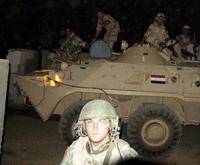|
|
| Private First Class Lance Marottek of Alpha Company, 1st Battalion, 14th Infantry Regiment, 25th Infantry Division watches over a line of Sons of Iraq members awaiting their turn at the monthly payday. Behind him, other soldiers do biometric retinal screening of new Sons of Iraq members in the Tarmiyah area, creating a database enabling easy verification of identities. Photo by Nathan Webster. |
The $300 a month in pay earned by Sons of Iraq members is hard-earned. As many as 10 members of Tarmiyah’s Sons of Iraq forces have been killed this summer, including up to a half-dozen in an Aug. 10 attack that also claimed a US soldier with Alpha Company, 1st Battalion, 14th Infantry Regiment, 25th Infantry Division.
The US soldier, Sergeant. Kenneth Gibson, was moving civilians he believed were too close to a US cordon around a bomb when twin suicide bombers attacked, according to Lt. Col. Thomas Boccardi, 1st/14th commander. Two other US soldiers were injured, but Boccardi said they would be fine. As many as 17 Iraqis were killed, The Los Angeles Times reported. Those killed include policemen, Sons of Iraq members, and “toddlers, teens and women,” Boccardi said.
Boccardi said it was a “pre-planned, deliberate attack,” that involved a bomb specifically planted to draw in first responders, followed by the suicide attack.
Despite this high-casualty attack, the overall security situation in Tarmiyah is vastly improved from 2007, and the summer has seen no statistical up-tick in violence.
Part of that credit goes to the Sons of Iraq, and while the atmosphere around their next payday will likely be different in the aftermath of this attack, the scene itself will likely be about the same.
The June payday took two days at the residence of Sheikh Imad, the head of the council and son to Sheikh Sa’ed Jassim, an influential local leader. It’s not at all as simple as handing each member his $300 monthly paycheck.
Each Sons of Iraq member – about 500 from Tarmiyah itself and another 100-plus from outlying areas – had his identity confirmed through a variety of identity checks. American soldiers from Alpha Company used the biometric screening to confirm retinal scans that had been taken previously, and old photo IDs were matched up face-to-face with each member.
“We’ve already scanned them and put them in the system,” said Specialist Celso Batilo. “Now we can confirm they’re the right person.”
Prolonging the process was the issuance of brand new photo IDs to all the members. Instead of the old, somewhat easy to fake, IDs, these new ones have a bar code for easier documentation. It’s a vital part of the process. Some reports said the Aug. 10 attackers impersonated Sons of Iraq members, whose only uniform is often a reflective belt. Iraqi civilians obviously need some way to know a true member is.
About 50 to 60 new members were also signing up, said First Lieutenant Derek Curry, platoon leader, and enrolling them will also take a little longer.
Waiting in a long line on a hot day, the Sons of Iraq members kept up a running banter with the US infantrymen providing security. Both groups were often the same age, and though the language barrier forestalled anything but a few passing pleasantries, the friendly comments did help pass the time.
Four other Tarmiyah Sons of Iraq members were killed this summer. Two died when a moped V-BED was detonated when they stopped the vehicle at a checkpoint, and two others were killed when they picked up an IED – contrary to explicit US warnings against doing that.
Despite those earlier casualties – fairly high in a short time for a relatively small group – the vast majority of the Sons of Iraq apparently stayed on post. During the payday activities, a wounded member, his leg injured in the second blast, walked by the US soldiers, limping but present and accounted for.
The June payday scene outside the Sheikh’s house was somewhat chaotic. Men show up, are let in from a street side iron door, and then line up along a compound wall, waiting at another gate to be let into the screening and pay area. Like any line, there are occasional disagreements about who is ahead of whom, and a few brief instances of pushing and shoving.
The men congregate at gate entrance, sometimes making it difficult for US soldiers to come and go, as they push through the tight group of a dozen Iraqis. At one point, Specialist Leonard Daniels tells them all to move along – “I told them to stay lined up against the wall. If I had to come over again, they weren’t getting paid today.” Maybe an idle threat, maybe not.
After their identities were verified, the Iraqis went into the payday room, where they would be paid, not personally by Americans, but by their Sons of Iraq council. They would end up with about $250, after the “handling fees” were taken out, said one US officer; it’s not really a skim, but a form of kickback to other things, like the “martyr’s fund” for families of killed members – a more aggressive form of union dues, maybe.
The common stereotype is that the program, with its cash handed off to local leaders who pay it out however they want, is rife with corruption and skims. In fact, local power, not money, is perhaps a more important factor.
Imad, for example, is contracted to employ around 500 Sons of Iraq at $300 a month, to man a certain number of checkpoints. It is within his power to stretch that money to employ, at some level, a larger number of members.
For instance, a Sons of Iraq member might work for three months, but be paid for only two – not a full salary, but some salary all the same. Consequently, Imad gains much more than a few bucks off a kickback scheme – he gains influence across the entire Tarmiyah area. Now, perhaps 700 local men, maybe more, depend on him for some of their salary. He becomes more powerful in the city, and just as significantly to him, to the tribe itself.
“He’s contracted to provide security at a certain number of checkpoints,” said Alpha Company commander Captain Christopher Loftis. “We’re not really concerned with exactly how he does it.”
Other groups, like one led by Abu Zuffayan in the southern half of Alpha Company’s area of operation, are not truly contracted as Sons of Iraq members. Instead, his organization receives money from a fund of Iraqi money controlled by the coalition – to remove the risk of corruption – to conduct civil works projects. The money technically pays for men to clear roads and clean ditches.
“Maybe the guys clear ditches for free; maybe they man the checkpoints for free,” Loftis said. But, one way or the other, the checkpoints are consistently manned. It’s enough money and influence to motivate Zuffayan, a somewhat shady character who has links to the Jaysh Al Rashadeen Sunni insurgent movement, to work with the coalition.
Loftis said he can tell some sense of a secure future has returned to the region. He sees it in marriages and furniture stores. The first was pointless under the random violence during al Qaeda in Iraq’s local influence, and the second essentially forbidden under fundamentalist al Qaeda’s enforcement of Sharia law. Now, a couple stores offer western style wedding gowns.
“You’ll still see some vestiges of AQI. Pictures of women with their faces blacked out,” Loftis said. “Now, newer stores have pictures of normal, pretty Middle Eastern women, just like normal Mid-East advertising.”
The Sons of Iraq now have more ways to spend their money. The paydays have become more important.
But, with al Qaeda-linked attackers claiming a US soldier’s life, and those of many Iraqis, security remains the most vital thing of all.
Postscript:
The accompanying low-quality picture shows Sergeant Kenneth Gibson, of Alpha Company’s 3rd Platoon, 1st Battalion, 14th Infantry Regiment, at Checkpoint 120, about a mile from Alpha Company’s main headquarters in downtown Tarmiyah. A few other pictures of him were taken in the dark of late evening, June 9, 2008. This is the best of a poor lot.
He didn’t seem to mind the camera flash going off in his face. But he did finally say, “Flash is bright, huh?” which was taken as an invitation to stop taking his picture.
Gibson was a vehicle commander who stayed with his Stryker during long missions. His platoon received the least amount of coverage during a recent embed. Photographic opportunities of him didn’t occur again.
Embedded reporters meet plenty of soldiers that are never spoken to at length. A picture might be taken and maybe there’s a brief chat, then the reporter moves on to the next thing. A reporter sometimes lets stories slip away.
This picture’s quality is weak and amateurish. The picture’s subject, Sergeant Kenneth Gibson, 25, from Christiansburg, Virginia, was the precise opposite.
Nathan Webster was embedded with US forces in Tarmiyah during the month of June.










7 Comments
The payback on this $100 (or $300 per mo.) is huge. The issue of security in Iraq has blossomed into what has become a secure (for the most part) country.
My concern is what happens upon withdrawl of U.S. troops and financial assistance. These Sons of Iraq will need to be able to find significant employment beyond our presence. Hopefully, the oil companies currently engaged in ramping up oil production will be able to bring uneducated Iraqi men into the fold for a on-the-job training program in the oil industry.
This is the only realistic employability industry in Iraq and must be developed (I say) BEFORE we leave.
Nathan, what are the on-going job training prospects and programs currently and what emphasis is being placed on them for the future?
The last thing Iraq needs is tons of formerly employed IA personnel with no means of employment or viability within the Iraqi free society.
Having read about the Iraqi trade surplus, mostly from oil, I had assumed that the Iraq Govt would have the funds to fold the Sons of Iraq into IP units and continue to pay them. They will still be needed, even once security is so good that there are very few IEDs or suicide bombers, it only takes one. There will need to be checkpoints and high security measures in Iraq for years to come.
God speed, Sgt. Gibson
Updated: Long War Journal’s Nathan Webster is embedded with Sgt Gibson’s Alpha Company and has this recent picture of him: He also has this to say:The accompanying low-quality picture shows Sergeant Kenneth Gibson, of Alpha Company’s 3rd Platoon, 1st B…
The Iraqis do fund some of the SoI. Depends on where you are in Iraq as to how far that has transitioned to ISF.
– Not all of the SoI want to join the IP (or IA).
That is what the job training programs are about.
– Literacy is a requirement to join the voluntary IA/IP.
That is a major issue that is also requiring schools
– Then there is the honor issue. They guard the town. That has prestege. They do not want to give that up.
Of note, the CG 17th IA Div in south Baghdad has also mentioned wanting to form the SoI in his area into an IA Reserve. That is something I asked MNSTC-I about last December. At the time they said there was no plan for an IA Reserve.
To me, an IA reserve with literacy training is the answer to transitioning them…
I know this site is primarily focused on the military aspect of the Iraq war, with political commentary as it becomes relevant, but I think it would be interesting to see an in-depth analysis of Iraq’s economy.
Alex…..
Try this.
http://www.iraqupdates.com/p_articles.php/scat/43
and this….
http://www.iraqreport.com/